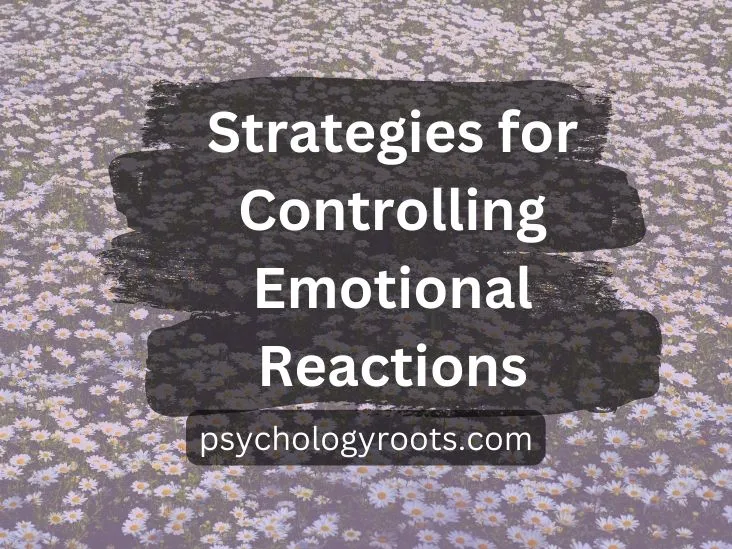Table of Contents
Strategies for Controlling Emotional Reactions
Here in this post, we are discussing “Strategies for Controlling Emotional Reactions”. You can read more about psychology-related material on our website. Keep visiting Psychology Roots.
Emotional outbursts are episodes of severe, unexpected emotion, such as fury, rage, or irritation, that are out of proportion to the triggering event. The inability to control one’s emotions may lead to emotional and mental suffering, as experienced by the individual having an outburst. Relationships at home, school, or the office may all suffer as a result.

Some examples of outbursts of emotion
An emotional outburst might cause a person to overreact to something that, under normal circumstances, would not cause them any distress. A few examples of how they could respond, which might appear excessive given the circumstances:
- A burst of fury or irritation
- Crying or yelling fits
- Insulting or threatening other people
- Doing things like slamming doors, stomping, creating a mess, or damaging property
- Behaving in ways that cause them physical harm, such as bashing their head or punching walls
- Tossing objects about
- Physical aggression such as striking, kicking, biting, or spitting
Why Emotional Outbursts Occur
A person’s emotional state is not something they are naturally able to manage. Teenagers may struggle with controlling their emotions at first, but as they become older, they often learn techniques for doing so. Young children are still developing the skills they need to manage their emotions effectively, and they may be overwhelmed by some events. The following are examples of such things:
- having the impression that they are being criticised
- Disappointment in oneself or others due to a lack of understanding
- Problems with quick gratification of demands
- Substantial Modifications to Daily Activities
- Disappointment at one’s own incapacity to complete a job
- A variety of factors include hunger, tiredness, and fluctuating hormone levels
Disrupted Emotional Regulation
It’s not uncommon for folks to lack the coping mechanisms necessary to deal with intense feelings. Emotional dysregulation occurs when individuals struggle to control their unpleasant emotions. Reasons for these irrational outbursts include, but are not limited to:
- Anxiety and mood disorders including depression, bipolar disorder, OCD, and ADD/ADHD are just a few examples of the many mental problems that may affect a person’s daily life (ADHD)
- Experiencing abuse or neglect as a child is a traumatic experience.
- PTSD, or Post-Traumatic Stress Disorder (PTSD)
- Factors that may be traced back to a person’s genes
- Symptoms of a Brain Injury
Signs You Can’t Handle Your Emotions
One’s inability to regulate their emotions may manifest in a variety of ways.
- Having trouble putting your feelings into words
- An inability to comprehend how you feel
- Lack of emotional acceptance
- Feelings without understanding
- Having no control over your feelings
- Becoming emotionally overloaded
- Problems maintaining self-control that might benefit one’s
- an intended or successful result
Conquering Your Angry Mood
You may attempt the following methods if you’re having trouble controlling your anger:
Take a deep breath and relax:
If you’re feeling furious, do something that helps you relax. Some examples of this kind of activity include going on a stroll, listening to music, doing deep breathing exercises, and doing some light stretching or yoga.
You need to remove yourself from this scenario.
If you need to go away from a stressful environment, whether it’s at work or with friends and family, be sure to communicate your desire to do so.
Engage in acts of self-care:
Taking care of your body on a consistent basis might help you keep your emotions in check. Maintaining a healthy diet, regular exercise routine, and sufficient sleep hours may boost everyday performance and alleviate stress.
Seek the assistance of professionals.
Talking to a medical or mental health professional may help you get insight into the causes of your out-of-control emotions and work with you to create a plan for calming your nerves. If your anger is caused by a mental health issue, medication may also be recommended.
Keep in mind that you may need to address the underlying reasons of your emotional outbursts and that these methods may not work for everyone. Please check in with your doctor to be sure you are receiving the treatment you need.
Help Us Improve This Article
Have you discovered an inaccuracy? We put out great effort to give accurate and scientifically trustworthy information to our readers. Please notify us if you discover any typographical or grammatical errors.
Make a comment. We acknowledge and appreciate your efforts.
If you have any scale or any material related to psychology kindly share it with us at psychologyroots@gmail.com. We help others on behalf of you.